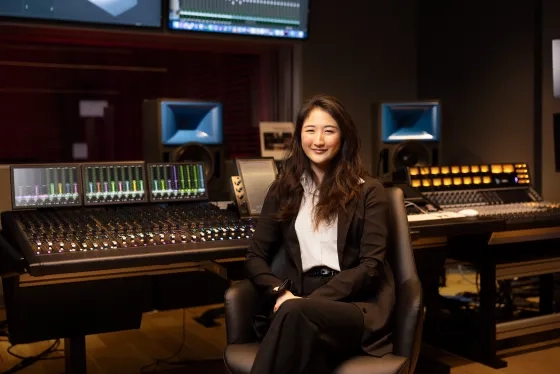New TAC Student Arrives From a Surprising Place: Clarinet Performance
Eugenia Coe is preparing to enter SFCM’s Technology and Applied Composition Program for the next phase of her musical journey after getting her Bachelor’s as a classical clarinetist.
By Alex Heigl
While a clarinet might initially seem a little out of place among the massive speakers and mixing boards in SFCM’s state-of-the-art Studio G, Eugenia Coe is working to change that.
Coe finishes her undergrad as a clarinetist in 2022 and will be returning to SFCM next year to join the TAC program, which aims to get students familiarized with the technological nuts and bolts of film, movie and video game scoring and sound design, along with modern recording techniques.
“Around my second year, I started hanging out with a lot more TAC people,” Coe said. “Just sort of getting more into what they were about, going to shows with them. And it aligned with the things that I had started to want to do at the time.”
For her senior recital, Coe had a two-part program, in which the first half was classical programming and the second half delved into contemporary composers like Nico Muhly and Volker Bertelmann (aka Hauschka), known for his compositions involving prepared piano. (The Hauschka piece Coe performed was also released on her teacher Jeff Anderle’s record Branching Patterns.)
It was the forced downtime necessitated by the COVID-19 pandemic that gave Coe room to think about her future in a new light. “I was still here on campus, but everything was online. And I had a lot of time to not really care about clarinet." She adds jokingly, "I got lazy, I didn’t want to practice, there were no performances to practice for, so I started getting into other kinds of music and that’s when I seriously started to consider going into TAC.”
A major change like this in music education is rare, but not uncommon at SFCM. “It is becoming more common for students to recognize the wide range of opportunities within the music industry today,” SFCM Professional Development and Engagement Director Kristen Klehr said, “and so it makes sense that more and more students are looking to diversify their career reach, as well as add more to their ‘musical tool box’ for that competitive edge within the music industry.”
“It wasn’t an easy decision, because I didn’t want to completely abandon classical music; I love playing in orchestra and chamber music. In my mind, it felt like I had to make a decision between classical and TAC stuff, so I had a lot of conversations with my parents that were really helpful; I had a lot of conversations with Professor Anderle. I decided that, going to TAC didn’t mean I was abandoning my clarinet, but rather enhancing my work with the instrument.”
"This kind of change isn’t an 'either/or decision,” Klehr reinforced. “You can deepen your learning in a new field, expand your opportunities within diverse networking, and carry on a vibrant music performing/teaching/recording/creating career! It's all about what lights you up, sparks your artistry, and brightens your curiosity.”
Coe laughed recalling her first meeting with TAC Executive Director Taurin Barrera, saying, “he asked me what I wanted to do, and … it turned out there were too many things I wanted to do. But I gave him some examples of what I had done and what I wanted to do, and he suggested the program I’m in as my path.”
While she’s “a very big advocate” for chamber music, Coe is most excited about developing her voice as a soloist in conjunction with her TAC studies, envisioning herself playing over backing tracks she’s composed. And since she’s been playing piano longer than she has clarinet, she feels comfortable sitting down at a keyboard to write, though she “doesn’t think of herself as much of a pianist” so she uses her clarinet to think melodically.
Coe also said she’s excited about the possibility of doing sound design, even foley work, for film, TV and video games, which has its roots in a childhood memory of when once practicing some excerpts from “Peter and the Wolf” for an audition, when her sister, in the other room, thought a triplet figure from the piece was an excerpt from a Mario game.
The video game connection continued recently: “Last semester I was asked to record for the Sony recording project, where TAC students were given a fake video game and composed for it, and I just kept thinking the whole time, ‘This is really cool!’”
Coe has grand plans for her career after finishing the TAC program. She’s a big fan of animated YouTube videos and the collaborations between animators, graphic designers and musicians and hopes to develop an organization that would foster similar relationships.
The sky—animated or otherwise—is the limit.
Learn more about SFCM's TAC department or woodwinds here.
